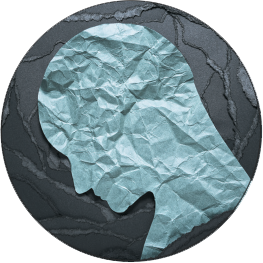
Destigmatizing Mental Health – What Can You Do?
The stigma around mental health is such a difficult topic. I hesitated to take on the challenge of writing this article because, despite being a mental health professional for over 20 years, I still struggle with not being biased myself. However, seeing the struggle that my friends, family and community have dealt with throughout the years, but especially during the past 1-2 years due to COVID-19, I felt compelled to speak out in order to assist others. One of the good things that came out of the COVID-19 pandemic is that it brought talking about mental health into the forefront and made the conversation about mental health “mainstream.” People are speaking up about their challenges and asking for help, but too many stigmas and misunderstandings remain.
Current statistics note that 1 in 5 American adults experience some form of mental illness in any given year and 1 in every 20 adults is living with a serious mental health condition (such as schizophrenia, bipolar disorder or long-term recurring major depression). That means at least one person you work with or know is struggling right now. Symptoms can include: sleep problems, lack of concentration, aches and pains, irritability, low motivation or self-medication. This can cause significant impacts in the workplace, including an estimated $200 billion in lost earnings each year. Eight in 10 workers say shame and stigma prevent them from seeking treatment for a mental health condition (https://www.nami.org/Get-Involved/Pledge-to-Be-StigmaFree/StigmaFree-Company).
Despite recent advancements in mental health treatment and many celebrities talking about their own personal struggles with mental health, stigma about mental health continues. Some of these stigmas include:
- That people with a mental health disorder are dangerous
- The reality is that those suffering from mental health are more likely to be the victims of violence rather than the perpetrators. They are more likely to hurt themselves than others.
- That you can just “get over it”
- Some mental health conditions are transitory and go away with time, but if the condition is interfering with your functioning or you feel you need help, then professional assistance is required. This may be in the form of therapy, medication management or a combination of both.
- Blaming the person for their condition
- A mental health condition is not the person’s fault. You wouldn’t tell someone with diabetes to “just get over it”; the same is true for a mental health condition. Improving one’s condition is possible, even probable, but requires professional assistance. Most mental health conditions are caused by a chemical imbalance in the brain and not something that you can just “get over,” but you can get help.
So, what can we do to help destigmatize mental health conditions? One of the first ways to combat mental health stigma is to evaluate your own thoughts, feelings and prejudices about mental health, which will help you respond with more empathy and less judgment. The second way is to talk about mental health more openly, encourage others to speak to you about their challenges and to be willing to listen. Often, just listening is the best thing that you can do to help someone. Third, normalize mental health in your vocabulary and make it a topic it’s OK to talk about. What is your language and thought process about taking a “mental health day” versus a “sick day”? Going to a therapy appointment is just as important as going to a doctor’s appointment.
The good news is that help is out there and we, as case managers, can help our clients, patients, families, co-workers and ourselves to get it! The widespread adoption and coverage of benefits for telehealth services means that professional help has never been easier or more convenient to receive.
Once someone has overcome the stigma and asked for help, educate yourself on options available to help the person and encourage them to get the help they want and need.
AVAILABLE RESOURCES
If you are in need of immediate assistance, please call the National Suicide Prevention Hotline at 1-800-273-TALK (8255) or text MHA to 741-741 to talk to a trained counselor from the Crisis Text Line. Coming by July 2022, dialing 9-8-8 will connect you to the National Suicide Prevention Hotline.
- United Way 2-1-1 can link with resources and local community providers.
- National Alliance on Mental Illness (NAMI) has extensive resources on mental health diagnoses, types of treatment, local and online support groups and video resources to assist. (https://www.nami.org/Home)
- Mental Health America (MHA) also has multiple resources to help. They offer screening tools, warmlines, support groups and other sources of assistance. (https://www.mhanational.org/)





